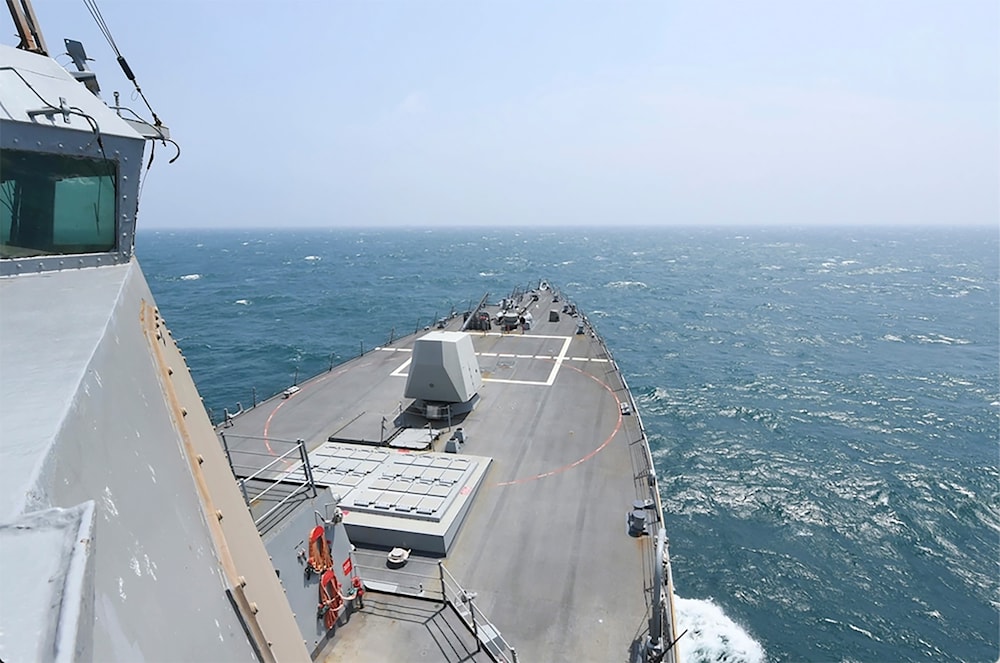US-Taiwan navies held quiet Pacific drills in April: Reuters
A source told Reuters that the drills did not officially exist and were dubbed "unplanned sea encounters," labeling them as a tacit agreement.
-

The US Navy, the Arleigh Burke-class guided-missile destroyer USS Halsey (DDG 97) conducts routine underway operations while transiting through the Taiwan Strait Wednesday, May 8, 2024. (AP)
Four people told Reuters that the US and Taiwan navies carried out joint drills in the Pacific in April that were off the books.
The United States has been reinforcing alliances with countries in the Asia-Pacific region, raising tensions as it amps up its rhetoric against China.
The sources, who asked to remain anonymous, told Reuters that these non-publicized drills happened last month in the Western Pacific, with one source revealing that "multiple military assets" were part of it.
The drills were off the books and were dubbed "unplanned sea encounters," a second source told Reuters.
Revealing that these exercises were a tacit agreement, which the US and Taiwan claimed that they were due to a coincidental encounter, the second source explained "It's like I am dining in this restaurant and you also happen to be here," adding, "Then it looks like I am only sharing the same table with someone."
The days-long exercises, which comprised half a dozen navy ships from both countries, including frigates and supply and support vessels, were designed to practice "basic" operations like communications, refueling, and resupply, the source added.
Read more: Biden signs into law $95bln aid bill to Ukraine, 'Israel', Taiwan
'Times of emergency'
Even though these "unplanned encounters" between the two navies included majorly basic exercises, they were important to ensure that both militaries could work together in times of emergency, a third source told Reuters, adding that various tactical maneuvers like looking for underwater targets were also part of these exercises.
In a statement to Reuters, Taiwan's navy said that it "acts in concert with the US-promoted Code for Unplanned Encounters at Sea", CUES, to deal with unexpected scenarios at sea, and to minimize "interference" with each other.
Without further explanation, it also said, "The Navy often makes contact with vessels of other countries and conducts encounter drills as needed."
About a decade ago, the CUES was launched under the guise of de-escalating tensions between militaries in the sea, setting out guidelines like safe speeds and distances, a common language of communication, and possible actions if a ship is disabled.
Reuters reported that the Pentagon refused to comment, and China's defense ministry did not immediately respond to comment.
Read more: Chinese reunification with Taiwan to devastate US, Commerce Sec. says
These are not the only drills involving the US in the region
Thousands of Filipino and American troops launched on April 22 joint military drills that went beyond the Philippines' territorial waters, in a first.
The annual drills – codenamed Balikatan, or "shoulder to shoulder" in Tagalog – were concentrated in the northern and western parts of the archipelago nation, near the potential flashpoints of the South China Sea and Taiwan.
China claims almost the entire waterway, a key route for international trade, and also considers Taiwan to be part of its territory.
The Chinese Army confirmed that China was conducting military "combat patrols" in the South China Sea on April 7 – the same day as joint drills by the Philippines, the United States, Japan, and Australia.
Beijing's People's Liberation Army (PLA) Southern Theater Command said in a statement that it was organizing "joint naval and air combat patrols in the South China Sea", adding, "All military activities that mess up the situation in the South China Sea and create hotspots are under control."
On April 6, China's Coast Guard reported that it "handled" a situation earlier related to a disputed reef where several ships from the Philippines were engaged in "illegal" operations.
Coastguard spokesperson Gan Yu said, "Under the guise of 'protecting fishing', Philippine government ships have illegally violated and provoked, organized media to deliberately incite and mislead, continuing to undermine stability in the South China Sea."
"We are telling the Philippines that any infringement tactics are in vain," Gan said, adding that China would "regularly enforce the law in waters under [its] jurisdiction."

 4 Min Read
4 Min Read








